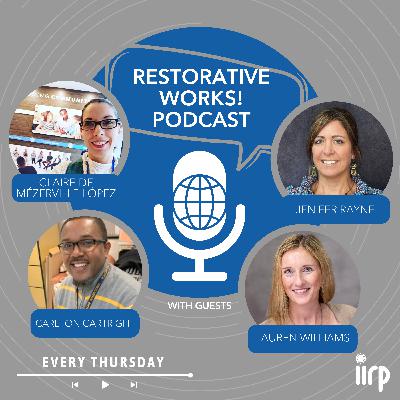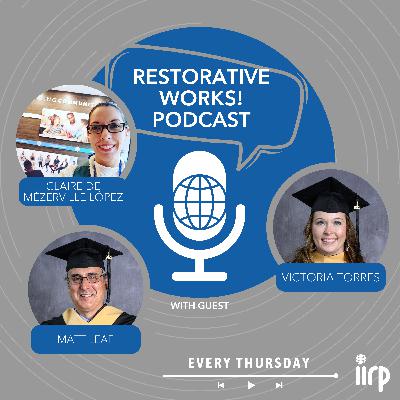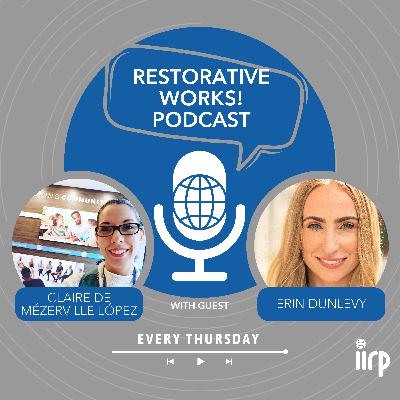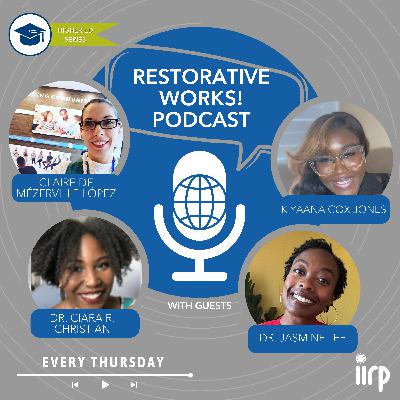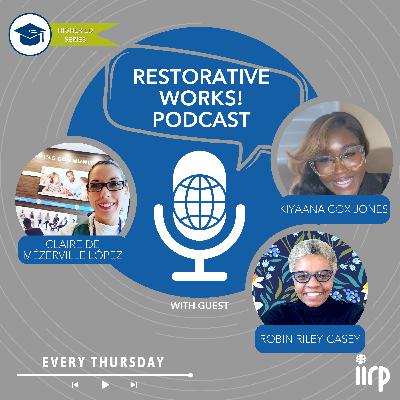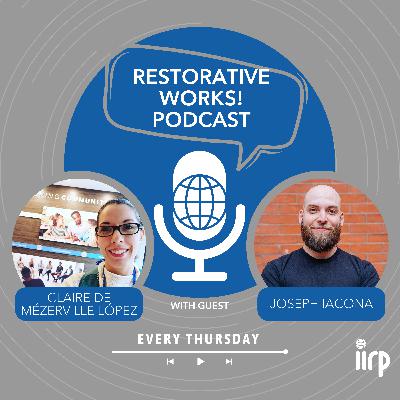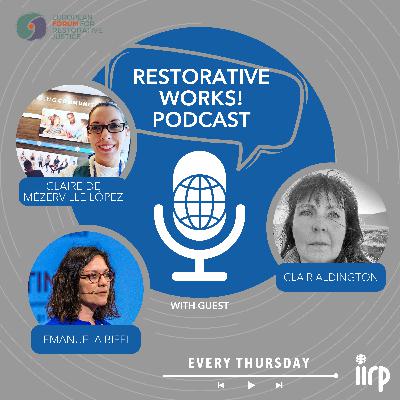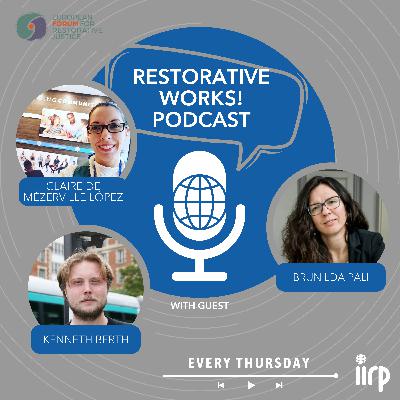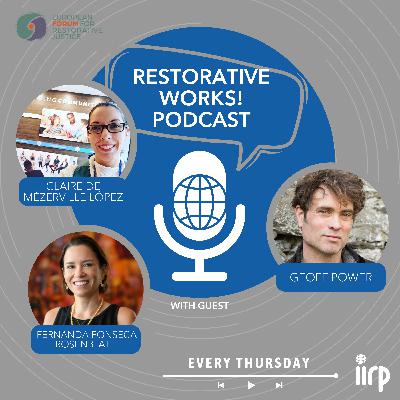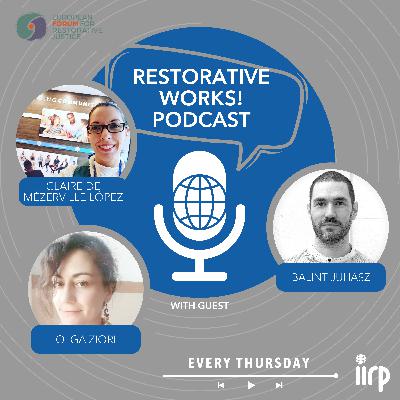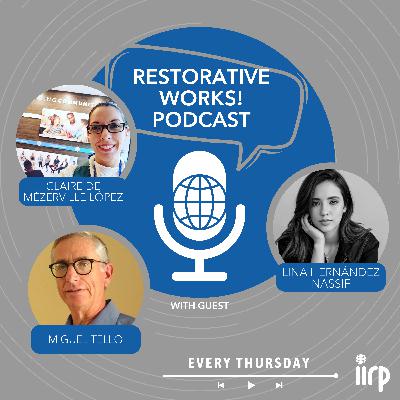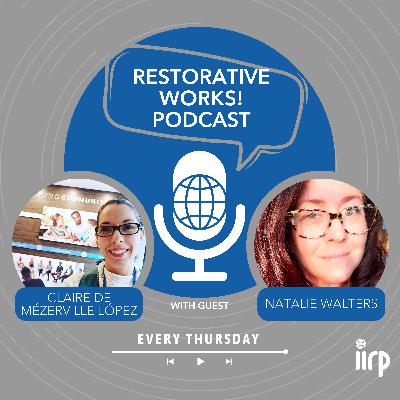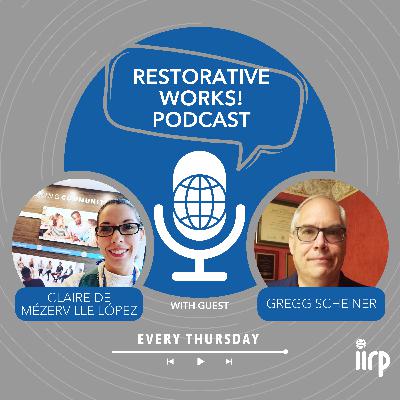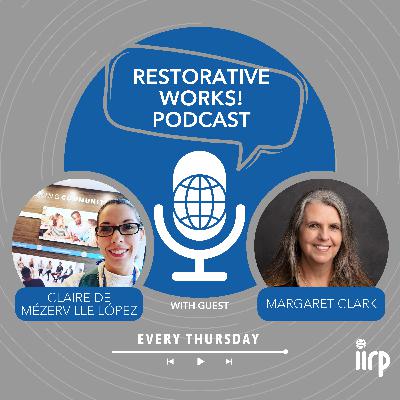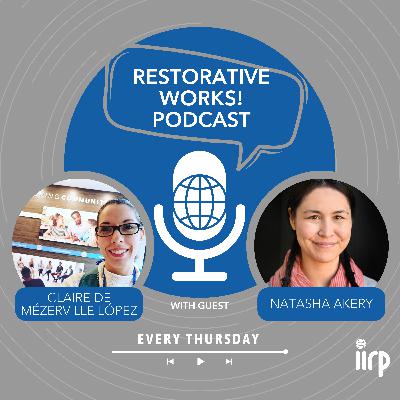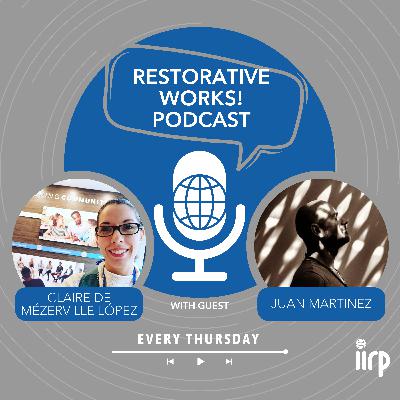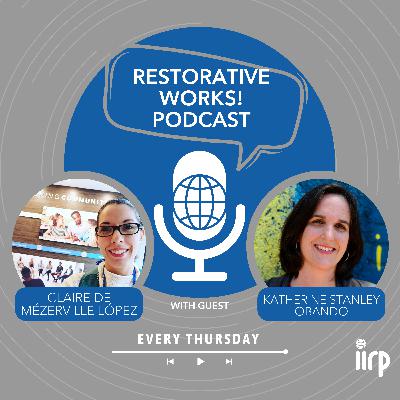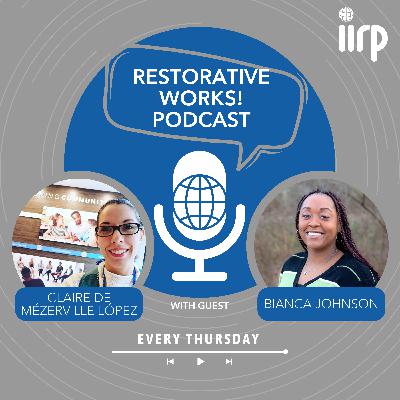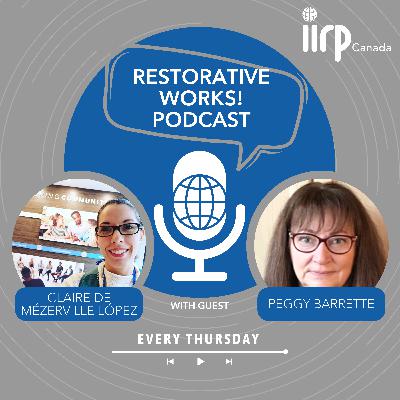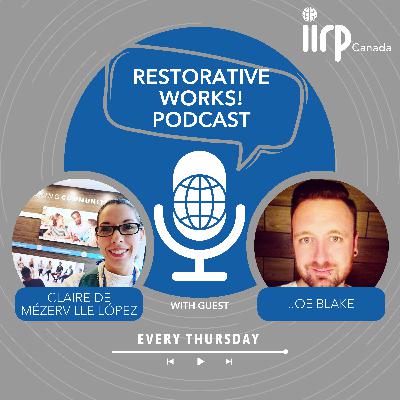Discover Restorative Works
Restorative Works

Restorative Works
Author: International Institute for Restorative Practices (IIRP)
Subscribed: 10Played: 332Subscribe
Share
© 2023
Description
Restorative Works! Hosted by Claire de Mézerville López, M.Ed., M.S., is centered around restorative practices – the study of building relationships and community. With guests from across the globe, we invite you to:
Listen and be inspired by transformational stories from passionate restorative practitioners, community leaders, researchers, and more.
Learn practical solutions to addressing harm/traumas and proactively increasing a sense of belonging in your community, schools, and at home.
Explore methods to facilitating meaningful conversations that create understanding and positively impact the people around you.
Listen and be inspired by transformational stories from passionate restorative practitioners, community leaders, researchers, and more.
Learn practical solutions to addressing harm/traumas and proactively increasing a sense of belonging in your community, schools, and at home.
Explore methods to facilitating meaningful conversations that create understanding and positively impact the people around you.
134 Episodes
Reverse
On this special episode of the Restorative Works! Podcast, host Claire de Mézerville López welcomes three leaders transforming school culture in Worcester County, Maryland: Dr. Jenifer Rayne, Principal of Pocomoke High School; Carlton Cartwright, Community School Liaison and Restorative Practices Coach; and Lauren Williams, Coordinator of School Health and Mental Health. Together, they share a decade-long journey of embedding restorative practices into daily school life—creating spaces where trust, connection, and accountability thrive. From early district-wide training sessions to the creation of “Restorative Practice Champions,” Worcester County Public Schools has built a living, evolving framework for fostering belonging. The team explains how conscious discipline, culturally responsive teaching, and adult-first self-regulation are equipping both educators and students with the skills to repair harm, navigate conflict, and sustain healthy relationships. Jenifer Rayne is entering her eighth year as Principal of Pocomoke High School in Worcester County, Maryland. A dedicated and visionary educator, Dr. Rayne has led this small, diverse high school to national recognition, earning distinctions such as National School of Character, Gold School of Opportunity, and Apple Distinguished School under her leadership. Dr. Rayne holds a bachelor's degree in Elementary Education from Stevenson University, a K–12 Special Education certification from the College of Notre Dame of Maryland, a master's degree in School Administration from Wilmington University, and a Doctor of Education in Supervisory Leadership from the University of Maryland Eastern Shore. Carlton Cartwright is a restorative leader and educator with over 26 years of experience supporting student success, access, and belonging on Maryland’s Eastern Shore. In his current role he leads initiatives that embed restorative practices frameworks into daily practice and strengthen school-community partnerships. Having received training from the IIRP, Carlton facilitates professional learning and student support systems across Worcester County Public Schools. He believes transformation happens when we lead with rather than to others—building trust, connection, and shared responsibility. His leadership extends beyond the classroom through service in his church, mentoring, and community engagement. Lauren Williams is a seasoned educational leader and licensed clinical social worker with over 15 years of experience advancing student mental health, family engagement, and restorative practices. As the Coordinator of School Health and Mental Health for Worcester County Public Schools, she leads district-wide initiatives that prioritize student well-being, inclusive leadership, and trauma-informed care. Her leadership philosophy is rooted in principle-centered values, collaboration, and the belief that lasting change happens with people, not to them. Currently pursuing her doctorate in Educational Leadership at the University of Maryland Eastern Shore, Lauren is a driving force behind restorative implementation, behavior reform, adult-first self-regulation practices, and community school transformation in Worcester County. Tune in to hear practical strategies—like revising the district’s code of conduct to reflect community-building values, integrating goals aligned with restorative practices into school improvement plans, and partnering with law enforcement for shared training.
In this special episode Claire de Mézerville López welcomes recent IIRP alumni, Matthew Leaf and Victoria Torres, to the Restorative Works! Podcast. Matthew and Victoria are experienced professionals in education. They join us to share practical strategies and personal stories that highlight how restorative practices transform school culture. From greeting students at the door by name to creating intentional spaces for connection, Matt and Victoria reveal that fostering a sense of belonging isn’t about one single action—it’s “a restorative way of being.” They discuss how mutual respect, authenticity, and empathy help both students and educators thrive, and why separating “the deed from the doer” is essential in addressing mistakes without shame. The episode also explores how educators can become “the greatest cheerleaders” for their students, invite families into the process, and model lifelong learning. Both guests share advice for graduate students and education leaders: listen to understand, remain curious, and never underestimate your power to make a lasting impact. Matthew is the assistant principal of Crew and Culture at Four Rivers Charter Public School in Greenfield, Massachusetts, where he is also a founding faculty member. He received his Master of Science in Restorative Practices with a specialization in Education from the IIRP this July. Matthew and his wife are recently empty nesters who enjoy time with their dog and spending time outdoors. Victoria is a dedicated school counselor practicing in Pennsylvania and also maintains a private therapy practice. She holds a Bachelor of Arts in Psychology from Cedar Crest College and a Master of Education in School Counseling from Lehigh University. She recently completed her coursework for a Master of Science in Restorative Practices with a specialization in Education, along with a graduate certification in facilitation for healing trauma from the IIRP. She and her husband recently celebrated their 12-year wedding anniversary and have two children; they enjoy spending time outdoors and exploring the world around them. Tune in to hear how proactive and responsive circles deepen relationships, how consistent processes build trust, and why curiosity can be the key to understanding behavior rather than reacting to it.
Claire de Mézerville López welcomes seasoned restorative justice practitioner and educator, Erin Dunlevy, to the Restorative Works! Podcast. In this series of episodes, we explore the use of restorative practices in higher education through various aspects of the college and university sphere. We are joined by Erin as she delves into the power of culturally responsive pedagogy and restorative justice practices. Erin shares insightful stories from her work in secondary and higher education, illustrating how restorative circles and relationship-centered approaches foster inclusive, equitable learning environments. She discusses how these practices can address critical issues like student engagement, literacy, and the school-to-prison pipeline. Erin also discusses innovative methods for evaluating restorative practices, emphasizing group dynamics and community-building over punitive measures. Erin is a New York City-based restorative justice practitioner and educator with nearly two decades of professional experience in schools and universities throughout the US, and she currently works on projects around the world training stakeholders from schools, districts, community organizations and for-profit companies who influence education. Her areas of focus include developing restorative justice models for peacemaking across lines of difference, truth and reconciliation, and critical consciousness. Her work has also focused on developing and implementing restorative justice models for addressing equity issues within secondary and higher education classrooms, specifically as an advocate for Culturally Responsive Pedagogy, Native Language Arts Education, and in-class restorative circles. Erin has written and presented extensively about evaluative measures for restorative practices in institutions cited for disproportionality and high incidences of violence. In addition to fieldwork, Erin is an adjunct professor at Columbia University, a visiting professor of restorative justice at the United Nations University for Peace, and serves as Vice President at the True North Center for Organizational Health. Erin is also the co-author of "Wisdom of the Circle: A Restorative Practitioner's Deck". Tune in to hear more inspiring and relatable stories from the classroom with Erin and gain practical insights that you can apply in your classroom today.
Claire de Mézerville López welcomes Dr. Jasmine A. Lee and Dr. Ciara R. Christian to the Restorative Works! Podcast. Claire is joined again by co-host and IIRP Lecturer Kiyaana Cox Jones. In this series of episodes, we explore the use of restorative practices in higher education through various aspects of the college and university sphere. Dr. Christian and Dr. Lee share insights from their roles as co-directors of the Center for Social Justice Dialogue at the University of Maryland, Baltimore County, in the Division of Institutional Equity, highlighting the intersection of restorative practices and social justice education. They delve into the critical considerations for dignified intercultural and intergroup experiences, emphasizing the importance of identity, systemic awareness, and creating spaces for authentic dialogue across differences. As Dr. Lee eloquently states, "The goal is to widen the crack where we refuse to see each other as fundamentally opposed, fostering spaces for transformation and collective growth." Dr. Lee is a diversity, equity, inclusion, and justice scholar, practitioner, trainer, and coach. She has spent over 15 years in higher education, working with students, staff, and faculty to create inclusive campus environments through direct programming and strategic campus-wide leadership, and currently serves as the Associate Vice President for Community and Culture at UMBC. Beyond higher ed, Dr. Lee works with K-12 institutions, non-profit organizations, and faith-based communities to provide training, consulting, coaching, and organizational change services, partnering with clients to curate unique, engaging solutions that lead to sustainable, measurable change. Dr. Lee is a qualified administrator of the Intercultural Development Inventory® (IDI), a certified diversity trainer with the National Coalition Building Institute, a Restorative Practices trainer, and a certified Mental Health First Aid instructor, and uses these skills to ensure human dignity, love, truth, honesty, and empathy are a part of all approaches to organizational change. Dr. Christian has been professionally engaged in diversity, equity, inclusion, and social justice work for over a decade. Dr. Christian discovered her passion for this work as a result of her experiences in the Peace Corps, where she both noticed and experienced gaps in cultural competency within the organization. This experience served as a catalyst for her return to higher education, allowing her to more deeply explore identity development, social inequality, and social change. Ultimately, this led her to intergroup dialogue as a vehicle for helping others to engage deeply about and across differences. Her practice is rooted in an ethic of radical, revolutionary love and a commitment to helping others see and center our shared humanity. Tune in to explore how restorative practices embody revolutionary love, inviting us to wonder deeply about each other's humanity and to navigate conflict and grief with empathy and accountability.
Claire de Mézerville López welcomes Robin Riley-Casey to the Restorative Works! Podcast. Claire is joined again by co-host and IIRP Lecturer Kiyaana Cox Jones. In this series of episodes, we explore the use of restorative practices in higher education through various aspects of the college and university sphere. Join us as Robin shares insights on the power of face-to-face connection and its role in community building. She discusses how restorative practices reshape adult culture on college campuses, emphasizing the importance of seeing each person beyond their titles or roles. Discover Robin's journey through restorative practices, from creating transformative listening circles to fostering genuine connections among students and colleagues. Her wisdom on slowing down, embracing wonder, and accepting personal growth resonates deeply as she navigates the complexities of leadership and community engagement. Robin is the Associate Dean of Students and Director of College Life Community and Belonging at Muhlenberg College in Allentown, PA. Her work is the hub of cultural exchange, supporting 18 affinity groups, including community advocacy groups and ethnic/racial, gender/sexuality, and alternative arts communities. In her role, Robin utilizes dialogue, collaboration, and action to promote and facilitate cross-cultural learning communities. Robin serves on several Muhlenberg College committees: the President’s Diversity Advisory Council, Health and Wellness, and the Athletic Diversity Council. Robin currently serves on two local boards, New Bethany Ministries and Allentown West End Alliance. Tune in to hear more about Robin’s personal evolution and the soulful journey of restorative practices, as she inspires us all to listen deeply and build meaningful connections.
Claire de Mézerville López welcomes IIRP alumnus Joseph Iacona to the Restorative Works! Podcast. We are joined by Joseph as he takes us behind the scenes of projects in schools, libraries, prisons, shelters, and behavioral health facilities, revealing how restorative practices create authentic collaboration between artists and communities. He shares powerful stories, including a mural co-created with youth aging out of the foster care system—a project that evolved into a living, breathing space of connection and care years after the paint dried. As a featured speaker at the IIRP’s upcoming World Conference on Artful Integration, Joseph offers a preview of his presentation on the parallels between successful public art projects and restorative leadership. He issues a call to action for more intentional partnerships between artists and restorative practitioners to use art as a tool for authentic collaboration and social change. Joseph is a visual artist and restorative practitioner. He has initiated more than 100 community art projects in schools, libraries, museums, prisons, shelters, behavioral health facilities, and other public service centers. As the director of the Mural Arts Institute for Mural Arts Philadelphia, the United States’ largest public art nonprofit, he develops resources on community driven mural-making for other artists and public art advocates around the world. Joseph holds a Master of Science in Restorative Practices with a specialization in Community Engagement from the IIRP and a Bachelor of Fine Art with concentrations in painting and art history from Kutztown University of Pennsylvania. He's an upcoming featured speaker at the IIRP's next World Conference on Artful Integration, Exploring the Art and Science of Restorative Practices. Tune in to hear more from Joseph as he explores how defining “community” is an essential first step, and how tools like narrative mapping can uncover shared values and vision.
Claire de Mézerville López is joined by co-host, Professor Emanuela Biffi, for the “Powerful Intersection Between Restorative Justice and Art” podcast series, a special initiative by the IIRP together with the European Forum for Restorative Justice (EFRJ). Art has the unique ability to connect and facilitate dialogue, making it a powerful tool in restorative justice practices. Throughout the series, we examine how artists from different disciplines and cultural backgrounds use their creative expression to foster communication, build empathy, and potentially repair harm. Each episode highlights a different aspect of this intersection, featuring conversations with artists who have contributed to restorative justice We are joined by Dr. Clair Aldington as she discusses her research on integrating visual and movement-based languages into the restorative justice process. She co-founded Space to Face, an award-winning charity in Scotland, emphasizing how creative expression can facilitate healing dialogues and trauma articulation. Discover how Dr. Aldington’s work extends beyond verbal communication, using art as a catalyst for emotional connections and solidarity between individuals involved in conflict. She reflects on pivotal moments where art objects symbolized reconciliation and inspired lasting change in both victims and offenders. Her research challenges traditional Western practices by advocating for more inclusive, visually oriented approaches to restorative justice. Dr. Aldington has authored several academic articles and book chapters regarding her practice and research. She is the co-founder of the award-winning Space2face restorative practices and arts charity in Shetland, Scotland, and a co-facilitator of an international restorative circle group, the Encounter of the Encounters, in cases of political violence. Her work has pioneered the use of art and design approaches within restorative practices. Specifically, how creative approaches can aid dialogue and the articulation of trauma, particularly in cases of serious crime, thereby improving the accessibility of restorative processes. Dr. Aldington holds a doctorate in Design and Restorative Justice and a master’s in Contemporary Art and Music. She is a freelance researcher and practitioner with over twenty years of experience in the field of restorative practices. Dr. Aldington is a keynote speaker at the upcoming 2025 IIRP World Conference, Artful Integration: Exploring the Art and Science of Restorative Practices. Emanuela is the program coordinator at the EFRJ, an international network organization that brings together about 300 members dedicated to research, policy, and practice of restorative justice in the criminal justice system and beyond. She joined the EFRJ team in September 2013, working as a project officer in different EU-funded projects on access to restorative justice, justice and security in intercultural settings, restorative justice training, child victims, and arts. Among other responsibilities at the EFRJ, she organizes its main international events (conferences, seminars, webinars, and art festival), coordinates proposals for EU-funded and other projects, and guides the overall management of working groups and committees within the EFRJ membership. Originally from Italy, Emanuela studied Liberal Arts at the University College Maastricht (The Netherlands) and University of Gaborone (Botswana) with a focus on social psychology and criminal law and the Master program in Criminology at KU Leuven (Belgium). Tune in to explore the challenges and rewards of training artists and facilitators in restorative practices. By highlighting the potential of creative mediums to bridge cultural and linguistic divides, we uncover universal avenues for healing and understanding.
Claire de Mézerville López is joined by co-host, Professor Brunilda Pali, for the “Powerful Intersection Between Restorative Justice and Art” podcast series, a special initiative by the IIRP together with the European Forum for Restorative Justice (EFRJ). Art has the unique ability to connect and facilitate dialogue, making it a powerful tool in restorative justice practices. Throughout the series, we examine how artists from different disciplines and cultural backgrounds use their creative expression to foster communication, build empathy, and potentially repair harm. Each episode highlights a different aspect of this intersection, featuring conversations with artists who have contributed to restorative justice processes through various art forms — be it visual arts, music, theatre, film, or dance. We are joined by Kenneth Berth, a celebrated Belgian storyteller and radio maker, as he shares his journey from personal tragedy to artistic exploration and delves into the profound impact of storytelling on healing and justice. Kenneth's work, known for its depth and empathy, reflects on his own experience with a life-altering accident and his quest for understanding through restorative justice. Through theater and documentary, Kenneth bridges the gap between personal trauma and collective empathy. His projects, including the acclaimed podcast Born This Way, reveal the power of narratives to connect, heal, and provoke dialogue on complex societal issues. Brunilda serves as Assistant Professor of Conflict Dynamics and Governance at the Department of Political Science at the University of Amsterdam and Chair of the EFRJ. She researches, teaches, and publishes on gender and feminism, restorative, environmental, and social justice, cultural and critical criminology, and arts and justice. Kenneth is a Belgian radio, documentary, and theater maker. As a Belgian public broadcaster, he created the podcast Born This Way (Zo Geboren), in which he explores the history of homosexuality in Belgium. He has also produced podcasts for BBC Radio 3 on topics such as being stuck in traffic, and for the Dutch public broadcaster on the act of looking out the window. He is a host at the Belgian radio station Studio Brussel. Kenneth was awarded the prestigious title of Master Storyteller by the Dutch Narrative Journalism Foundation, Stichting Verhalende Journalistiek. His work has been nominated for three Prix Europa awards and the Prix Italia. Tune in to learn more about how art, empathy, and restorative justice intersect!
Claire de Mézerville López is joined by co-host, IIRP Associate Professor, Dr. Fernanda Fonseca Rosenblatt, for the “Powerful Intersection Between Restorative Justice and Art” podcast series, a special initiative by the IIRP together with the European Forum for Restorative Justice (EFRJ). Art has the unique ability to connect and facilitate dialogue, making it a powerful tool in restorative justice practices. Throughout the series, we will examine how artists from different disciplines and cultural backgrounds use their creative expression to foster communication, build empathy, and potentially repair harm. Each episode will highlight a different aspect of this intersection, featuring conversations with artists who have contributed to restorative justice processes through various art forms — be it visual arts, music, theatre, film, and dance. Geoff Power joins us to share his compelling journey integrating restorative justice into his creative works. From producing documentaries highlighting societal issues to crafting impactful plays like Stronger, Geoff’s artistry explores complex themes of community, relationships, and personal transformation. Geoff reflects on his experience teaching creative writing at Midlands Prison, offering a unique perspective on how art can empower individuals within the justice system. His plays poignantly portray the human side of restorative justice, inspired by real-life stories of resilience and healing. Geoff is a playwright, documentary producer, print journalist, and sports reporter, with creativity having always been at the heart of his work. Based in Dublin, Geoff also works in Portlaoise prison, one of Ireland’s maximum-security prisons, as a creative writing teacher. This work has helped to steer Geoff’s documentary work with Midas Productions, as well as to inspire the writing of Stronger for Gúna Nua’s production in the Dublin Theatre Festival and featured in the EFRJ’s 2020 REstART Festival. Across a range of creative mediums including film, tv, theatre and literature, Geoff’s skills as a creator and producer reveal consistent themes of social justice and inequality often expressed through the voices of the marginalized in society. Tune in as we uncover the profound impact of storytelling in advocating for restorative practices globally.
Claire de Mézerville López is joined by co-host Bálint Juhász, for the “Powerful Intersection Between Restorative Justice and Art” podcast series, a special initiative by the IIRP together with the European Forum for Restorative Justice (EFRJ). Art has the unique ability to connect and facilitate dialogue, making it a powerful tool in restorative justice practices. Throughout the series, we will examine how artists from different disciplines and cultural backgrounds use their creative expression to foster communication, build empathy, and potentially repair harm. Each episode will highlight a different aspect of this intersection, featuring conversations with artists who have contributed to restorative justice processes through various art forms — be it visual arts, music, theatre, film, and dance. Olga Ziori joins us to discuss the crucial role of restorative justice in child protection. Olga, a seasoned lawyer and restorative justice mediator, shares her profound journey from working with unaccompanied minors in refugee settings to advocating for compassionate, community-based solutions. Through poignant storytelling and innovative approaches, Olga reveals how she integrates restorative practices into challenging environments, fostering empathy and cultural understanding among vulnerable populations. From using narrative therapy to empowering minors as peer mediators, Olga's work highlights the resilience and healing potential within restorative justice. Olga Ziori is a Child Protection Expert and a Lawyer of Kavala Bar Association in Greece. Olga holds an LLM in Human Rights and a master’s in social policy. Since 2011, she has been working with unaccompanied minors and children in conflict with the law, in various refugee camps in Greece. As a restorative justice facilitator, she has applied restorative practices and community mediation as part of her work in the refugee camps. She is an Accredited Mediator (Greek Ministry of Justice) specializing in Child Inclusive Family Mediation and School Mediation. She uses folk tales as a restorative justice tool in her work with vulnerable communities. After attending her first folk tale storytelling festival, she fell in love with the art of storytelling. Her love of folk tales led to a diploma in “Folk Tale in Education: Creative Reading, Critical Literacy and Use” and the beginning of a lifelong journey in the world of storytelling. Bálint, a Hungary native, has been working extensively with education and training programs, cultural project management and theatre internationally. Previously, he was the educational program manager of the performing arts company, Krétakör. He led Krétakör Free School, a democracy awareness program for students. He has experience working with marginalized groups of society. In Brussels, he led community theatre workshops for vulnerable families. He holds a degree in Literature and Linguistics from ELTE University Budapest and completed a master’s in education with a focus on drama at Trinity College Dublin. He joined the EFRJ in 2019 to contribute to the organization’s training development and communication. Tune in to uncover the impact of storytelling in conflict resolution, its therapeutic value, and practical applications in educational settings and beyond.
Building Sociedades Más Justas: Youth Justice in Colombia Claire de Mézerville López and cohost IIRP Lecturer A. Miguel Tello welcome Lina Hernández Nassif to the Restorative Works! Podcast. Lina brings a wealth of experience from her work implementing restorative justice programs, particularly with youth in Colombia. Her journey spans from coordinating conflict resolution programs in prisons to facilitating initiatives for vulnerable teenagers across diverse socio-cultural contexts. In this compelling conversation, Lina shares pivotal outcomes from her programs, emphasizing the crucial role of victims in the restorative justice process. By placing survivors at the heart of justice initiatives, Lina and her team create safe spaces where individuals can process trauma, find closure, and embark on paths to reconciliation. She highlights success stories of teenagers who, after engaging in restorative justice, have overcome adversity to pursue education, employment, and stable lives. Lina dispels myths about restorative justice, stressing its practical application beyond theory. She advocates for professionals to engage directly with communities, fostering understanding and support for youth facing complex challenges. Her insights challenge conventional punitive measures, advocating instead for collaborative efforts among institutions to maximize impact and promote societal healing. Lina has a wide range of experience implementing restorative justice processes. She coordinated programs focused on conflict resolution inside and outside prisons with adults. In recent years, her work has focused on caring for youth within the criminal responsibility system, specifically for teenagers from different socio-cultural contexts such as migrants, natives, LGBTIQ+ community, and more. In 2022, Lina had the opportunity to work for the World Food Program through the Corporation for Community Social Development in the registration of more than 60,000 Venezuelans in vulnerable conditions so they could have access to government benefits in the Antioquia territory. Recently, she has been in charge of the coordination of the judicial monetary program for drug treatment, which was developed in an agreement between the government of Antioquia and the prison fellowship of Colombia to develop restorative justice processes for teens who have committed crimes due to drug use and addiction. Tune in to learn more about Lina’s work and the expansiveness of the impact restorative justice can have on youth and their communities.
Claire de Mézerville López welcomes Natalie Walters to the Restorative Works! Podcast. Natalie joins us to share her inspiring journey and innovative approaches to restorative practices integration in school settings. This includes the creation of Practice Academy—an initiative revolutionizing in-school suspensions by keeping students within the educational community, guiding them through reflection, learning, and reintegration. She discusses the pivotal role of emotional intelligence and proactive relationship-building through initiatives like Building Rocks, a program fostering classroom connections from day one. Through heartfelt anecdotes and practical insights, Natalie illuminates the impact of restorative practices on students, educators, and families alike. Discover how she navigates complex relationships with families, ensuring every interaction is rooted in understanding and support. Natalie has served as a Restorative Practices Specialist at Roxborough Road Elementary within the North Syracuse Central School District where she focused on supporting students' social emotional development, teacher well-being, and guiding the integration of restorative practices for the district. In this role, she collaborated with educators and staff to implement restorative practices towards greater community building, reflective conflict resolution, and heightened family engagement. A notable aspect of her approach included the involvement of her beloved dog, Sydney, who visited the school to assist in creating a welcoming and supportive environment for students and introduced the district to therapy dog partnership. Natalie also created and collaborated with staff on an actionable approach to the inclusion of restorative circles within the school day entitled Building Rocks. This workbook focuses on the concepts of relationship building in a classroom, focusing on the first 10 days of circle processes for teachers to engage. Building Rocks is a guiding companion for teachers to utilize throughout the school year with supportive lessons and community engagement activities. Through her work, Natalie has built strong meaningful relationships among students, staff, parents, and community leaders, striving to align the district's mission to create a supportive educational environment. Tune in to delve into Natalie's vision for supportive education and her ongoing mission to cultivate compassionate communities within educational settings.
Claire de Mézerville López welcomes IIRP alumnus, Gregg Scheiner, to the Restorative Works! Podcast. Gregg joins us and shares how his inclusive approach to mediation and conflict resolution empowers students and community members alike. He shares impactful stories, such as his work with a Nassau County high school where students and staff engaged in peer mediation sessions, leading to lasting resolutions and strengthened community bonds. He introduces us to the innovative Truancy Continuum of Care project, which utilizes restorative principles to reintegrate students into classrooms with supportive, non-punitive strategies. His initiatives have significantly reduced truancy rates and fostered a sense of belonging among students. Gregg is the director of restorative practices at the Long Island Dispute Resolution Center of the EAC Network (LIDRC). Gregg has been an integral part of this Resolution Center team for over a decade. He previously served as trainer and outreach coordinator, making significant contributions to advancing restorative practices across Long Island. As a circles and restrictive practices trainer, he has developed impactful programs in conflict resolution, peer mediation, and diversity training. His work has strengthened partnerships with schools, nonprofits, and government agencies, expanding LIDRC's reach and impact. Gregg holds a Master of Science in Restorative Practices from the IIRP, Master of Business Administration in Marketing from Adelphi University, as well as a leadership certificate, and a Bachelor of Arts from Hofstra University in Cultural Anthropology with a minor in Sociology. Tune in to hear more as Gregg discusses the future of restorative practices beyond educational settings, envisioning a society where these principles guide all interactions, fostering social-emotional intelligence and balanced relationships.
Claire de Mézerville López welcomes Margaret Clark to the Restorative Works! Podcast. Margaret shares her inspiring journey of integrating Indigenous wisdom into restorative practices, highlighting how these approaches foster healing, accountability, and community connection. Drawing on her Canadian roots and extensive experience, she explains why centering Indigenous voices and values strengthens restorative justice efforts across diverse settings. Margaret emphasizes that restorative practices are not just conflict resolution tools—they’re pathways to building trust, repairing harm, and nurturing resilient relationships. Her insights illuminate the powerful role of storytelling, circle processes, and cultural humility in creating spaces where everyone feels heard and respected. Margaret is the manager of the Canadian Mental Health Association Vernon & District Restorative Justice Services. Her interest in restorative justice came about through her background of working in correctional centers as a life skills coach and treatment programs as a program coordinator/counselor. As a proud member of the Syilx Nation, Margaret is committed to sharing Indigenous knowledge in the North Okanagan. She is a respected voice on local committees and was recently honored with the King Charles III Coronation Medal for her leadership and service. With strong ties to the North Okanagan, Margaret carries a vision of learning and teaching about restorative justice principles and practices. Tune in to discover practical strategies and inspiring stories that demonstrate the difference restorative practices can make in healing individuals and communities.
Claire de Mézerville López welcomes Natasha Akery to the Restorative Works! Podcast. Natasha joins us and introduces her original framework, the “Restorative Compass,” a forward-looking alternative to the Compass of Shame. Designed to help students and educators navigate difficult emotions and conversations, the Restorative Compass guides users from reactivity toward engagement, self-compassion, and acknowledgment of others. In the classroom, she repurposes restorative questions to examine literary conflict, inviting students to explore who is impacted, how relationships shift, and how characters might repair harm. The result? Deeper learning, more critical thought, and powerful public speaking skills. From circle time with 9th graders to one-on-one conversations with overwhelmed educators, Natasha models what it means to be restorative in every interaction. She shares practical insights, real classroom stories, and how building a culture of safety and curiosity helps students thrive. Natasha is a high school English language arts teacher and professional developer who brings a restorative lens to literary analysis, classroom culture, and continuing education for teachers. Passionate about ancient literature, mythology, and folklore, she explores how stories can help build empathy and community. Natasha is also conducting graduate research on the impact of restorative literary analysis in secondary education, and her “Restorative Compass” framework has been a resource for faculty members of the IIRP and teachers across the country. She believes that when students feel seen and heard, powerful learning can happen. Tune in to hear more from Natasha and her passion for mythology, folklore, and ancient texts. She uses restorative practices to help students connect emotionally and intellectually with stories, fostering empathy, deep analysis, and meaningful relationships.
Claire de Mézerville López welcomes Juan Martinez to the Restorative Works! Podcast. Juan joins us and shares his experience as a dedicated yoga instructor innovating with inclusive yoga practices in unconventional spaces. We explore how yoga and meditation foster compassion and wellbeing within challenging environments, including prisons and centers for vulnerable populations. Juan shares his journey from the corporate world to becoming an accredited teacher, spreading the healing benefits of yoga through programs like Yoga Inclusivo Costa Rica and collaborations across Central America. Through poignant anecdotes and reflections, Juan illustrates how yoga is more than physical exercise—it's a tool for empowerment, agency, and self-discovery. Learn how Juan navigates logistical challenges to bring yoga to prisons, creating safe spaces for inmates to find peace and inner strength. Juan is a seasoned advertising and design professional, with over a decade of experience in advertising agencies across Costa Rica. In 2001, he was introduced to the practice of yoga. Today, Juan is an accredited Yoga teacher with the Costa Rica Ashtanga Association, the European Yoga Institute, Yoga 10, AccessibleYoga.org, the Prison Yoga Project, and the Trauma Center. Juan has extensive experience as an instructor with a specialization in working with disabled and prison populations. His approach goes beyond postural practice and seeks to show a sanctuary, a laboratory, an opportunity, a place for contemplation and expression of compassion, and respect for ourselves as well as for life itself through yoga. Tune in to hear firsthand accounts of transformation and resilience as individuals find solace and hope through yoga, reshaping their lives amidst adversity.
Claire de Mézerville López welcomes Katherine Stanley Obando to the Restorative Works! Podcast. Katherine shares how restorative practices show up organically in her work as a journalist, particularly in rural areas where trust, voice, and relationships are essential. Through El Colectivo 506, a Costa Rican journalism collective rooted in community, collaboration, and care, Katherine and her team practice a relational approach to storytelling by listening first, amplifying community voices, and prioritizing local leadership. Their journalism isn’t extractive—it’s connective. Katherine is a journalist specializing in in-depth reporting on immigration, education, women’s rights, and civil society initiatives. She is the co-founder of El Colectivo 506, an award-winning, bilingual media organization that's using solutions journalism to build a "library of what works" in Costa Rica and beyond. She's also the co-founder of the Latin American Solutions Journalism Fund, which is training and funding in-depth journalism throughout the region. Katherine lives in San José with her husband Adrián and daughter Emma, for whom she wrote Love in Translation: Letters to My Costa Rican Daughter, published in 2016. Tune in to hear as Katherine describes how this innovative model, including listening circles and relation-based editorial practices, helps strengthen civic engagement and social cohesion across Costa Rica.
Claire de Mézerville López welcomes Bianca Johnson to the Restorative Works! Podcast. Bianca joins us and shares her introduction to restorative justice through a pilot diversion program that instantly resonated with her values. Her story highlights how relationships built in the community can open the door for meaningful engagement and real change within institutions. Bianca shares a moving story of a stolen car, a juvenile offender, and a powerful moment of healing and accountability that shows what’s possible when we center dialogue and compassion over punishment. This episode also explores the importance of proactive restorative work—building relationships before conflict arises. Bianca shares how students and staff in her schools now seek out restorative conferences and circles, showing the impact of cultivating a relational culture. Bianca is the family engagement and restorative justice coordinator at Charlottesville City Schools. She also works as a restorative justice facilitator with Central Virginia Community Justice, which provides a restorative justice diversion program. Through her work at City Schools and in the greater community, she helps create healing spaces for individuals and families impacted by harm. Bianca also completed professional development with the IIRP, informing her own training and facilitation to support both the school and greater community in relationship building and conflict resolution. Passionate about her work, Bianca is committed to strengthening relationships and promoting healing. Tune in to hear more of Bianca’s insight into what true community engagement looks like and the signs that show it's working: trust, empowerment, and people stepping into hard conversations with openness.
Claire de Mézerville López is joined by co-host, Executive Director of IIRP Canada, Pat Lewis, for a special IIRP Canada series, highlighting the use of restorative practices and restorative justice across Canada. In this episode, they welcome long-time educator and bilingual consultant Peggy Barrette to the Restorative Works! Podcast. Peggy joins us to share her journey of integrating restorative practices in French-speaking communities across Canada. Raised in a small, predominantly Francophone town in Northern Ontario, Peggy shares the impact of growing up straddling both French and English identities—and how those early experiences shaped her commitment to creating safe, authentic spaces for connection. Peggy discusses the cultural and linguistic challenges of bringing restorative practices to Francophone communities, where true equity demands more than just translation—it requires cultural relevance, deep listening, and honoring lived experiences. From fighting the pitfalls of superficial translations to ensuring French-speaking practitioners see themselves reflected in the tools and training they receive, Peggy unpacks what meaningful involvement really looks like. Peggy Barrette has more than 30 years of experience in the field of education. She is a bilingual (French and English) trainer and consultant for IIRP Canada. Peggy was born and raised in Hearst, a small, predominantly French town in Northern Ontario. She studied French at Lakehead University in Thunder Bay, Ontario, and received her master's in educational administration from the same university. Peggy spent 13 years working with the Thunder Bay Catholic District School Board and the remainder of her career with Trillium Lakelands District School Board in Ontario, where she led professional learning in French and English. As a school administrator, she has gained invaluable experience implementing restorative practices within diverse school communities. Tune in to learn more about working in bilingual contexts, navigating cultural identity in your community, and how language can shape the restorative journey.
Claire de Mézerville López is joined by co-host, Executive Director of IIRP Canada, Pat Lewis, for a special IIRP Canada series, highlighting the use of restorative practices and restorative justice across Canada. In this episode, they welcome seasoned youth care specialist Joe Blake to the Restorative Works! Podcast. Joe joins us to discuss the representation of Indigenous youth in Canada's justice system and the cultural disconnect they often experience. He explains how restorative practices align closely with Indigenous ways of resolving conflict—centered on healing, empathy, and community. Through stories from his own practice, including a powerful anecdote involving two youth in a group home, Joe illustrates how even informal restorative conversations can defuse tension, foster understanding, and build authentic relationships. Joe is a restorative practices instructor with IIRP Canada. He runs restorative justice training workshops and has been working in the field of Child and Youth Care for more than fifteen years. Joe has a Master of Arts in Child and Youth Care. The research focus for his Master of Arts thesis is on restorative practices with Indigenous youth within the youth criminal justice system. Joe’s key areas of interest in the field particularly lie in the youth criminal justice system, youth rights, restorative practices, social justice, Indigenous practices, and youth advocacy. He teaches these topics at several Toronto-based colleges, including Toronto Metropolitan University, Sheridan College, and Durham College. Joe serves in a variety of family counselling and court-ordered supervised access program positions. Joe identifies as Ojibwe, First Nations and is especially aware of the challenges that Indigenous and other marginalized youth face. Tune in to learn more about how restorative justice offers a meaningful alternative to punitive systems by promoting accountability without shame, and how youth themselves begin to use these tools in their homes and schools.


